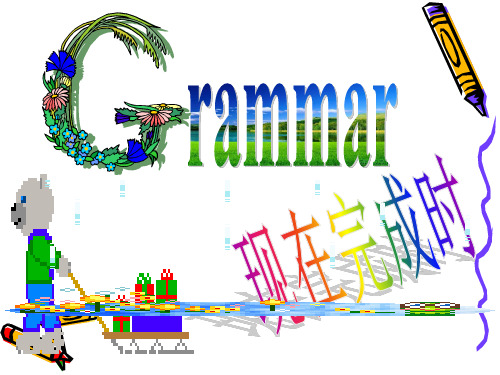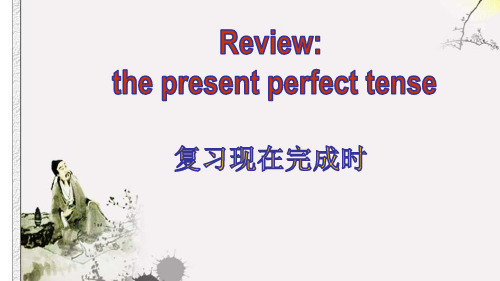中考专项复习——现在完成时复习课件.ppt
合集下载
初三英语《现在完成时》PPT课件

They have lived here since 1990.
What has happened to the USA in the last 350 years?
注意点一: 现在完成时与一般过去时的用法比较 现在完成时表示过去的动作一直延续到现在甚至会继续下去或表示 过去的动作对现在造成的影响;一般过去时表示动作发生的时间在 过去。现在完成时属于现在时态范围,因此,不能和表示过去的时 间状语连用。 如:yesterday, last night, two weeks ago等 试比较: The plane has arrived . 飞机已经来了。(说明现在的情况:飞机 在这儿) The plane arrived a quarter ago. 飞机是一刻中以前来的。(强 调动作发生的时间在过去) I have taught here for fifteen years. 我在这儿已经教了十五年。 (表示十五年前的动作一直延续到现在,还可能会继续。) I taught here for a year. 我过去在这儿教过一年。(表示“我“现 在已经不在这儿任教了)
((√×))
He has joined the League member for two years. ( ×)
√ He has been a League member for two years. ( )
他已入团两年了。
The man has been dead for several years. The man has died for several years. 这个人已经死了几年了。
练习:用have(has) been 或have(has) gone 填空 A: Where __1__ Li Fei __1__? B: He __2__ to Hainan Island. A: How long __3__ he __3___ there? B: He ___4__ there for three days. A: When will he come back , do you know? B: I’m afraid he won’t come back recently. A: Could you tell me the way to Hainan Island? B: Sorry, I __5__ never __5__ there. A: How many times __6__ Li Fei __6___ to that place? B: He __7__ there only once.
What has happened to the USA in the last 350 years?
注意点一: 现在完成时与一般过去时的用法比较 现在完成时表示过去的动作一直延续到现在甚至会继续下去或表示 过去的动作对现在造成的影响;一般过去时表示动作发生的时间在 过去。现在完成时属于现在时态范围,因此,不能和表示过去的时 间状语连用。 如:yesterday, last night, two weeks ago等 试比较: The plane has arrived . 飞机已经来了。(说明现在的情况:飞机 在这儿) The plane arrived a quarter ago. 飞机是一刻中以前来的。(强 调动作发生的时间在过去) I have taught here for fifteen years. 我在这儿已经教了十五年。 (表示十五年前的动作一直延续到现在,还可能会继续。) I taught here for a year. 我过去在这儿教过一年。(表示“我“现 在已经不在这儿任教了)
((√×))
He has joined the League member for two years. ( ×)
√ He has been a League member for two years. ( )
他已入团两年了。
The man has been dead for several years. The man has died for several years. 这个人已经死了几年了。
练习:用have(has) been 或have(has) gone 填空 A: Where __1__ Li Fei __1__? B: He __2__ to Hainan Island. A: How long __3__ he __3___ there? B: He ___4__ there for three days. A: When will he come back , do you know? B: I’m afraid he won’t come back recently. A: Could you tell me the way to Hainan Island? B: Sorry, I __5__ never __5__ there. A: How many times __6__ Li Fei __6___ to that place? B: He __7__ there only once.
中考语法专项复习-现在完成时 课件(共36张PPT)

years ago .
7.After breakfast she takes a walk to buy the morning paper she does this every morning for ten years .
4.She has read the book last week .
C
5.My classmates and I have visited
the memorial hall of chairman Mao
yesterday .
6.My grandmother has lived with us
since my grandfather has died six
C.has saved D.were saving
6.I was so happy to see John again
last Sunday ,We ______each other
for more than two years. A.haven’t seen B.hadn’t seen
C.didn’t see
What a boring film!
一部多么令人厌烦的电影啊!
It’s the most boring film I’ve ever seen.
这是我看过的最令人厌烦的电影。 *现在完成时除了上述主要用法之外,还有一些其它用 法,在此不一一讲解,请学生自已学习、掌握。
现在完成时与一 般过去时的区别
一.现在完成时和一般过去时都是 说过去的事情,但现在完成时注意 的不是事情本身,而是强调事情与 现在保持的某种密切联系(如现在 的结果,影响,一直延续到现在 等);而一般过去时,则只表示发 生在过去的动作和事情与现在没有 关系。
7.After breakfast she takes a walk to buy the morning paper she does this every morning for ten years .
4.She has read the book last week .
C
5.My classmates and I have visited
the memorial hall of chairman Mao
yesterday .
6.My grandmother has lived with us
since my grandfather has died six
C.has saved D.were saving
6.I was so happy to see John again
last Sunday ,We ______each other
for more than two years. A.haven’t seen B.hadn’t seen
C.didn’t see
What a boring film!
一部多么令人厌烦的电影啊!
It’s the most boring film I’ve ever seen.
这是我看过的最令人厌烦的电影。 *现在完成时除了上述主要用法之外,还有一些其它用 法,在此不一一讲解,请学生自已学习、掌握。
现在完成时与一 般过去时的区别
一.现在完成时和一般过去时都是 说过去的事情,但现在完成时注意 的不是事情本身,而是强调事情与 现在保持的某种密切联系(如现在 的结果,影响,一直延续到现在 等);而一般过去时,则只表示发 生在过去的动作和事情与现在没有 关系。
2024年中考英语语法复习+—现在完成时课件

They have gone.他们已经走了。
Have you seen the doctor? 你看过医生了吗?
在现在完成时中,当主语是I/you/we/they时,助动词用 have;当主语是第三人称单数时,助动词用has。
三、现在完成时的使用
1.表示过去发生并结束的动作对现在所产生的影响
He has left the city. 他已离开了这个城市。(结果:他不在这个城市。)
一、基本构成:have/has+done
I have finished my homework. 我已完成了作业。 (这里的finished就是动词finish的 过去分词。)
二、现在完成时不同人称的用法 I have washed my car.我洗过车子了。
We have done the whole work.我们干完了所有活儿。
A.practised
B.were practising C.have been practising
C
3 . —Where is mother?
—She is in the kitchen. She ________ the
housework all morning.
A.is doing
B.was doing
B.was studying
C.studied
D.have been studying
D
15 . “I _____ as everyone expects ”, Yao Ming
said .
A.haven’t played
B.haven’t been playing
C.didn’t play
D.am not playing
Have you seen the doctor? 你看过医生了吗?
在现在完成时中,当主语是I/you/we/they时,助动词用 have;当主语是第三人称单数时,助动词用has。
三、现在完成时的使用
1.表示过去发生并结束的动作对现在所产生的影响
He has left the city. 他已离开了这个城市。(结果:他不在这个城市。)
一、基本构成:have/has+done
I have finished my homework. 我已完成了作业。 (这里的finished就是动词finish的 过去分词。)
二、现在完成时不同人称的用法 I have washed my car.我洗过车子了。
We have done the whole work.我们干完了所有活儿。
A.practised
B.were practising C.have been practising
C
3 . —Where is mother?
—She is in the kitchen. She ________ the
housework all morning.
A.is doing
B.was doing
B.was studying
C.studied
D.have been studying
D
15 . “I _____ as everyone expects ”, Yao Ming
said .
A.haven’t played
B.haven’t been playing
C.didn’t play
D.am not playing
中考英语复习:现在完成时课件 (共55张PPT)

Key words
yet
already
注意:already 用于肯定句,
yet 用于疑问句和否定句中
Has your brother ______ finished his A: ______ homework yet? (finish)
B: Yes, he ‘s already done it.
写出下列动词的过去式和过去分词:
visit visited repair repaired watch watched finish finished
move live love like
visited repaired watched finished
verb+ed
moved lived loved liked
never since
so far
到目前为止
have planted We _______ only ____________ 100 trees so far. (plant )
二、Adverbs of time(标志性的时间状语)
before(句末)(以前), 口诀 by now /so far(到目前为止), 以前从来不出现, once, twice, three times,… just(刚刚), 最近曾经一两遍, recently(最近), 自从刚刚for一段, yet(否/疑)(还/已经), already(肯)(已经), 目前已经很明显。 ever(否/疑)(曾经), never(从不), all one’s life(一生) , in /during the past /last 5 years(在过去的五年里), for + 一段时间
moved lived loved liked
初中英语现在完成时课件(共62张PPT)

speak-spoke-spoken
freeze-froze-frozen
ride-rode-ridden
get-got-gotten (got) forget-forgot-forgotten (forgot) 特殊:
am/is-was-been are-were-been,
do (does)-did-done go-went-gone
I have already done my homework. 否定句: I haven’t done my homework yet. 一般疑问句: Have you done your homework yet?
3. ever在现在完成时中的用法
肯定句/疑问句 : 句中 “曾经” I’ve ever been to Beijing. Have you ever been to Beijing?
catch,teach
ABB(含规则动词)
1.另有一些其它形式的变化。
have (has)-had-had lose-lost-lost feel-felt-felt stand-stood-stood
leave-left-left make-made-made spell-spelt-spelt
ABA
有些动词的过去分词与原形是一样的:
run-ran-run come-came-come become-became-become overcome-overcame-overcome
ABB(含规则动词)
原型 过去式 过去分词
例词
-eep -ept -ept
keep,sweep,sleep
-ell -old -old
加-ed 结尾是“辅音字母+y”
初中现在完成时讲解ppt

for
since
for
since
for
since
练习题: 1.It's a long time since we ____ (meet) last, isn't it? 2.--I know you ___________ (choose) a picture book among these. --Yes,Have a look at it, please. 3.So far, spaceships without people ___________ (reach) the moon and some other parts of the universe. 4.My father____ home for nearly three weeks. A.has gone away from B.has left C.has been away from D.went away 5.Mr. and Mrs. Green have_____in China for a week. A.been B.got C.arrived D.reached
eg.--- I’ve lived here for 15 years. eg.--- I’ve lived here since 15 years ago(1990)
选用for和since填空: 1.We haven’t seen each other ______ a long time. 2.His father has been in the factory ______ 10 years ago. 3.The film has been on ______ 20 minutes. 4.Mr Green has worked here ______ he came to China. 5.His grandparents have been dead ______ several years. 6. It’s five years _______ we met last time
since
for
since
for
since
练习题: 1.It's a long time since we ____ (meet) last, isn't it? 2.--I know you ___________ (choose) a picture book among these. --Yes,Have a look at it, please. 3.So far, spaceships without people ___________ (reach) the moon and some other parts of the universe. 4.My father____ home for nearly three weeks. A.has gone away from B.has left C.has been away from D.went away 5.Mr. and Mrs. Green have_____in China for a week. A.been B.got C.arrived D.reached
eg.--- I’ve lived here for 15 years. eg.--- I’ve lived here since 15 years ago(1990)
选用for和since填空: 1.We haven’t seen each other ______ a long time. 2.His father has been in the factory ______ 10 years ago. 3.The film has been on ______ 20 minutes. 4.Mr Green has worked here ______ he came to China. 5.His grandparents have been dead ______ several years. 6. It’s five years _______ we met last time
现在完成时vs过去完成时 课件-2024届中考英语专项复习时态和语态

表示动作或状态从过去某时开始,继续到 现在,可能继续下去,也可能刚刚结束。
此用法常与表示一段时间的状语连用,如:since+时间点, for+时 间段,in recent years,in the past years,so far,up to now等。
➢I have lived here for thirty years. ➢He has been in Singapore since ten years ago. ➢She hasn’t finished reading the book yet, so she can’t return
用法
表示在过去某一时间或动作之前已经发生 或完成了的动作。
此用法常与by, before等构成的时间短语连用, 也可与when, before等引导的时间状语从句连用。
➢ By the time I got outside, the bus had already left. ➢ When I got to school, I realized I had left my backpack at home. ➢ The movie had started before I arrived at the cinema.
smart.
A. was walking; have had
B. walked; bought
C. was walking; have bought D. walked; have had
5. In the past few years, great changes ______ in my hometown.
7. The train ______ before I reached the station.
2023中考英语必考 现在完成时 课件 (共35张PPT)

❖ We have never been to the Summer Palace.
我们从来没有去过颐和园。
❖ Have you ever been to Shenzhen? 你们曾经去过深圳吗?
完要什 成用么 时现情 ?在况
3. ever在现在完成时中的用法
肯定句/疑问句 : 句中 “曾经” Eg. I’ve ever been to Beijing.
Have you had breakfast yet?
注: 带already的肯定句变成否定句或疑问句时, 将already要变成yet放在句末.
Eg. She has already done her homework. 否定句: She hasn’t done her homework yet. 一般疑问句: Has she done her homework yet?
You have played the game before.
她摸了摸你的手机,发现很烫, 她立马就知道你玩过王者农药了。
You mother realizes that you have played the game.
You have played the game for five hours.
She has stood here since 2 hour ago. How long has she stood here?
上一页
选用 for和 since填空:
1.We haven’t seen each other __f_o_r __ a long time. 2.His father has been in the Party __si_n_c_e_ 10 years ago. 3.The film has been on __f_o_r__ 20 minutes.
中考英语语法专项复习:现在完成时态PPT课件

●短暂性动词不能与一段时间连用,这 些动词是: begin/start,finish/stop,come/go/arrive,le ave,borrow,join,buy,marry,die等。
●为了表述这种意思,我们常用相应的延续 性动词”来代替短暂性动词.
上一页
主菜单
下一页
begin/start→ be on finish/stop → be over come /go/arrive →be in /at leave → be away borrow → keep join→ be in /a member of marry →be married buy → have die → be dead Catch a cold →have a cold open →be open close →be closed Fall asleep →be asleep fall ill →be ill
2.__H_a_s__ he __s_e_e_n_(see) this film yet? Yes. When _d__id__ he _s_e_e__(see) it? He __s_a_w__ it last week.
3. _H_a__ve_you ever _b_e_e_n__(be) there many times?
(1984年以来,史密斯先生一直在这工作。)
I have known Daniel since 7 years ago.
自从7年前我就认识丹尼尔。
He’s learned about 500 words since he went to college.(他上大学以来大约学了五千个
英语单词)
上一页
主菜单
6. It’s five years _s_in_c_e___ we met last time.
●为了表述这种意思,我们常用相应的延续 性动词”来代替短暂性动词.
上一页
主菜单
下一页
begin/start→ be on finish/stop → be over come /go/arrive →be in /at leave → be away borrow → keep join→ be in /a member of marry →be married buy → have die → be dead Catch a cold →have a cold open →be open close →be closed Fall asleep →be asleep fall ill →be ill
2.__H_a_s__ he __s_e_e_n_(see) this film yet? Yes. When _d__id__ he _s_e_e__(see) it? He __s_a_w__ it last week.
3. _H_a__ve_you ever _b_e_e_n__(be) there many times?
(1984年以来,史密斯先生一直在这工作。)
I have known Daniel since 7 years ago.
自从7年前我就认识丹尼尔。
He’s learned about 500 words since he went to college.(他上大学以来大约学了五千个
英语单词)
上一页
主菜单
6. It’s five years _s_in_c_e___ we met last time.
中考英语复习现在完成时课件(共31张PPT)

翻译句子
1.妈妈不在这,她去上班了。
Mom isn’t here, she has gone to work.
2.Tom已经去过上海两次了。
添加
添加
添加
关键字Tom ha关s键b字een to S关ha键n字ghai twice.
现在完成时
Let's review!
现在完成时(第一层含义) 1.含义 2.结构 3.现在分词变化规则: 规则/不规则 4.句型转换 5.标志词
不
Type AAA ABB
ABC
规则变化
Original cost read meet catch ride speak drink eat
p. t. cost read met caught rode spoke drank ate
p.p. cost read met caught ridden spoken drunk eaten
现在完成时
Review
1. 我昨晚打扫了房间。
I cleaned my room last night.
2. 上周六他看了一部电影。
He watched a movie last Saturday.
3. 昨天我们去了公园。
点击输入标题二
We went to the park yesterday.
Look at these sentences
AAA型
ABB型 ABA型 ABC型 AAB型
不规则变化
(put-put-put read-read-read)
(meet-met-met buy-bought-bought) (come-came-came become-became-become) (go-went-gone do-did-done) (beat-beat-beaten)
现在完成时(16张PPT)初中英语专项复习课件

考查现在完成时标志词。题1中,15 days为时间段, 选用for。题2、3中, 7 o’clock和1974为时间点,选 用since。
【典例2】My parents ________Nanjing twice.
A. have gone to B. have been to
C. have been in
易错点1 现在完成时常见标志词辨析
ever用于疑问句,意为“曾经”,位于句中 Have you ever eaten fish?
never含否定意义,意为“从不”,位于句中 I have never eaten fish.
易错点1 现在完成时常见标志词辨析
just多用于肯定句, 意为“刚刚”,位于句中 I have just had my lunch.
B. yet
C. ever
D. still
考查现在完成时标志词。句意:他曾去过上海吗? 由题目可知为现在完成时。根据句意“曾经”, 选用ever。
【典例5】Have you met Mr Li ______?
A. just
B. ago
C. before D. a moment ago
考查现在完成时标志词。句意:你以前见过李先生 吗?ago用于一般过去时,just用于句中,答案只能 选C。
before用于所有句式, 意为“……之前”,位于句末
She hasn’t seen you before.
易错点2 since/for用法辨析
since
since+时间点 He has lived in China since 1992.
since+ 时间段+ ago John has been a football player since 3 years ago.
【典例2】My parents ________Nanjing twice.
A. have gone to B. have been to
C. have been in
易错点1 现在完成时常见标志词辨析
ever用于疑问句,意为“曾经”,位于句中 Have you ever eaten fish?
never含否定意义,意为“从不”,位于句中 I have never eaten fish.
易错点1 现在完成时常见标志词辨析
just多用于肯定句, 意为“刚刚”,位于句中 I have just had my lunch.
B. yet
C. ever
D. still
考查现在完成时标志词。句意:他曾去过上海吗? 由题目可知为现在完成时。根据句意“曾经”, 选用ever。
【典例5】Have you met Mr Li ______?
A. just
B. ago
C. before D. a moment ago
考查现在完成时标志词。句意:你以前见过李先生 吗?ago用于一般过去时,just用于句中,答案只能 选C。
before用于所有句式, 意为“……之前”,位于句末
She hasn’t seen you before.
易错点2 since/for用法辨析
since
since+时间点 He has lived in China since 1992.
since+ 时间段+ ago John has been a football player since 3 years ago.
初中语法——现在完成时-课件(共75张PPT)

1、规则变化(过去分词与过去时变化规则一样)
(1)、一般动词,在词尾直接加“ ed ”。 work---worked---worked visit---visited---visited
(2)、以“ e ”结尾的动词,只在词尾加 “ d ”。
live---lived
(3)、以“辅音字母 + y ”结尾的动词,将 “y” 变为 “i”,
3.The film has been on __f_o_r__ 20 minutes. 4.Mr Green has worked here _s_in_c_e__ he came to China.
5.His grandpa has been dead __fo__r __ several years.
肯定句: “己经”
I’ve already had breakfast. (常见) = I’ve had breakfast already.
一般疑问句: 句末(表示惊讶的语气) “难道”
Have you had breakfast already? (表示强调)
(2) yet
否定句:句末 “还(没)” I haven’t had breakfast yet.
You have planted all the trees. I have planted all the trees. He/she has planted all the trees. They have planted all the trees.
主语若是第三人称单数助动词用 has
过去分词
12. Tom has worn glasses _s_i_n_ce___he was 7 years old.
borrow arrive/come
(1)、一般动词,在词尾直接加“ ed ”。 work---worked---worked visit---visited---visited
(2)、以“ e ”结尾的动词,只在词尾加 “ d ”。
live---lived
(3)、以“辅音字母 + y ”结尾的动词,将 “y” 变为 “i”,
3.The film has been on __f_o_r__ 20 minutes. 4.Mr Green has worked here _s_in_c_e__ he came to China.
5.His grandpa has been dead __fo__r __ several years.
肯定句: “己经”
I’ve already had breakfast. (常见) = I’ve had breakfast already.
一般疑问句: 句末(表示惊讶的语气) “难道”
Have you had breakfast already? (表示强调)
(2) yet
否定句:句末 “还(没)” I haven’t had breakfast yet.
You have planted all the trees. I have planted all the trees. He/she has planted all the trees. They have planted all the trees.
主语若是第三人称单数助动词用 has
过去分词
12. Tom has worn glasses _s_i_n_ce___he was 7 years old.
borrow arrive/come
2024年中考英语语法课件-现在完成时

现在完成时肯定句的构成
第三人称单数(he/she/it)+ has+过去分词
Tom has been absent for three days. 汤姆三天没来了。 She has gone to the town. 她进城了。
例1 We have known each other
since 2005. 我们从2005年认识的。
现在完成时
现在完成时定义
现在完成时表示过去发生或已经完成的某 一动作对现在造成的影响,还表示过去已 经开始,并且持续到现在的动作或状态。
现在完成时定义三要素
1
2
3
现在为止已 经完成或刚 刚完成的动 作
一件发生在 过去的事情 对现在产生 影响
一个动作开 始于过去并 持续到现在
现在完成时肯定句的构成
(手是干净的)
现在完成时的用法
表示从过去开始并持续到现在的动作或状态。 She has learned English for 5 years. 她学英语已经五年了。 He has lived in Beijing since he was born . 从他出生那天起就住在北京。 Has he lived in Shenzhen for 4 years? 他住在深圳四年了吗?
They haven't finished the job yet. 他们尚未完成该项工作。
She hasn't travelled on a train . 她没有坐火车旅行过。
I haven't finished my homework yet. 我还没有完成我的作业。
现在完成时的疑问句的构成
过去分词的变化(规则)
一般动词,在词尾直接加“ ed ”。 work---worked---worked
初中九年级英语《现在完成时》复习公开课PPT课件

QUIZ:
1.Great changes _h_a_v_e_ta_k_e_n_ (take) place in__t_h_e_p_a_s_t__fe_w___y_e_a_rs.
2He _h_as___g_o_n_e_(go) to Beijing. He _w__i_l_l_c_o__m__e__b_a_c__k__to__m__o_r_r_o__w.
Review & take notes 复习背记并整理笔记
前情回顾:现在完成时小结 助动词have/ has + done
(一)表示过去发生的动作或已完成的动作对现在造成的影响。 时间状语 just;already; yet ; ever ; never; recently,
lately, before, twice, …
(二)表示过去发生的动作一直持续到现在,有可能继续下去. (延续性动词)
1 -- Where is Jack? -- He _h_a_s_g_o_n_e_t_o the park.
2 -- __H_a_v_eyou_e_v_er b_e_e_n__t_o_ Paris? -- No, I _h_a_v_e_ never _b_e_e_n__ t_h_e_r_e_.
3 Mary _h_a_s_b_e_e_n__in_ Shanghai _si_n_c_e five years ago.
3My parents _m_a_r_r_ie_d__(marry) in__2_0_0_0_, theyh_a_v_e_b_e_e_n__m_a_r_ri_e_d(marry) fo_r _tw__e_n_ty__y_e_ar_s.
4We _h_a_v_e__p_l_a_n_te_d__(plant) two thousand trees _s_o_f_a_r_.
现在完成时的课件PPT

肯定句表达注意事项
01
注意区分现在完成时与一般过去时的用法,现在完成时 强调过去发生的动作对现在的影响,而一般过去时只表 示过去的某个动作或状态。
02
注意have/has的变形,当主语为第三人称单数时, have要变为has。
03
过去分词的变化规则需要掌握,包括规则变化和不规则 变化。
03 现在完成时否定句式
针对性辅导
拓展延伸
根据学生的实际情况,教师进行拓展 延伸,提供更多相关知识和练习题目 ,帮助学生进一步提高现在完成时的 运用能力。
针对学生在练习中暴露出的问题,教 师进行针对性辅导,帮助学生解决问 题。
1.谢谢聆 听
肯定句
主语 + have/has + 过 去分词 + 其他成分。
否定句
主语 + have/has + not + 过去分词 + 其 他成分。
疑问句
Have/Has + 主语 + 过去分词 + 其他成分 ?
简略回答
Yes, 主语 + have/has. 或 No, 主语 + haven't/hasn't.
否定句表达注意事项
注意区分现在完成时与一般过去时
现在完成时强调过去发生的动作对现在造成的影响或结果,而一般过去时只表示过去某个时间发生的 动作或存在的状态。
注意have/has的否定缩写形式
have not=haven't,has not=hasn't。
现在完成时疑问句式和回答方
04
式
疑问句构成及用法
特点
具有现在相关的时间参照点,强 调过去动作与现在的联系。
- 1、下载文档前请自行甄别文档内容的完整性,平台不提供额外的编辑、内容补充、找答案等附加服务。
- 2、"仅部分预览"的文档,不可在线预览部分如存在完整性等问题,可反馈申请退款(可完整预览的文档不适用该条件!)。
- 3、如文档侵犯您的权益,请联系客服反馈,我们会尽快为您处理(人工客服工作时间:9:00-18:30)。
3. have / has been to
have / has gone to have / has been in
曾经去过某地 到某地去了 在某地呆了多长时间
1. A: Where’s Jim, Li Lei?
B: He _h__a_s_g__o_n_e__t_o__his school library.
He has gone to Shanghai.
现在完成时态的句式:
1.肯定句:主语+ have/has+过去分词+其他成分。 2.否定句:主语+have/has+not+过去分词+其他成分。 3.一般疑问句:Have/Has+主语+过去分词+其他成分? 4.特殊疑问句:特殊疑问词+have/has+其他成分?
此外还有leave, win, tell, spend, say,meet等等。
5. ABC型 (三者不一致)
eat give write see get begin
ate gave wrote saw got began
eaten given written seen gotten begun
此外还有go, take, know, speak, swim等等。
B. Have ; done ; finished
C. Have ; done ; have finished D. will ; do ; finish
4.Harry Potter is a very nice film .I___B____ it twice .
A. will see
B. have seen
C. saw
D.see
5. —These farmers have been to the United States .
—Really ? When _B__ there ?
2) since +过去点时间 since +一段时间+ago since +从句(从句用一般过去式)
e.g. He has worked here since 1990. She has taught in this school since two years ago. We have known each other since we met.
ever : never:
多用于疑问句,问初次经历。 e.g. Have you ever been to Beijing? 用于否定句,位于have/has后 e.g. He has never argued with other people.
just : before:
多用于陈述句,位于have/has后
2. The Greensh__a_v_e__b_e_e__n__in_China for three years.
3. Weh_a__v_e__b_e_e_n___to_the Great Wall twice.
It’s very beautiful.
翻译下列句子
她曾经去过上海。 She has been to Shanghai before. 他在上海10年了。 He has been in Shanghai for ten years 他去上海了。
study studied carry carried
写出下列动词的过去分词:
work like cry stay learn
worked liked cried stayed learned
use help finish cook arrive
used helped finished cooked arrived
C.wrote
D.has written
3.—Our country __C____ a lot so far .
—Yes . I hope it will be even ______ .
A. has changed ; well B. changed ; good
C. has changed ; better D. changed ; better
A. will they go
B. did they go
C. do they go
D. have they gone
6.— ___B___ you ___ your homework yet ?
—Yes . I _____ it a moment ago .
A. Did ; do ; finished
现在完成时复习
Review of the Present Perfect Tense
现在完成时的构成:
have/has + 动词的过去分词
注:动词过去分词的构成分为规则变化和不规则变化, 规则变化的动词过去分词与过去式是一样的,不 规则变化的动词须特殊记忆。
规则动词过去分词的构成构成规则Βιβλιοθήκη 1. 一般在动词后直接加-ed
肯定句:I have cleaned my bedroom. 否定句:I haven’t cleaned my bedroom. 一般疑问句:Have you cleaned your bedroom?
现在完成时和一般过去时的区别:
现在完成时,强调这一动作产生的结果对现 在的影响,与现在有关。 一般过去时,仅仅表示在过去某一时刻曾发 生过这一动作,与现在无关。
不规则动词过去分词的构成
1. 三个主要动词
is, am be
are
have/has
was were had
been had
do/does
did
done
2. AAA型 (三者一致)
cut let put cost read
cut let put cost read
cut let put cost read
3) so far, once/twice/ three times ,all one's life e.g. They have learnt 2000 words so far. Tom has seen the film twice. Her father has worked in the factory all his life.
1. Have you met Mr Li __C____? A. just B. ago C.before D. a moment ago
2. The famous writer _D___ one new book
in the past two year .
A. is writing
B.was writing
2. 以不发音的e结尾的动词, 直接加-d
例词
look looked play played
live lived hope hoped
3.末尾只有一个辅音字母的 重读闭音节词,先双写这 个辅音字母,再加-ed
stop stopped plan planned
4.结尾是“辅音字母+y”的动词, 先变“y”为“i”再加-ed
4) in the past +一段时间 during the last +一段时间
e.g. They have built many high buildings in the past three years.
Great changes have taken place in my hometown during the last two years
e.g. He is not feeling well now. He has caught a cold. I have lost the key. I can't go into my room.
2. 表示从过去已经开始,持续到现在的动作 或状态。
标志词: 1)for +一段时间
e.g. We have lived in this city for ten years.
He has studied English for five years.
(学习英语已经五年了,现在仍然在学)
He studied English for five years.
(只说明他过去学过五年英语,但现在不学了。)
1. He _h_as_w__o_rk_e_d_(work) in our school for one year. 2. He __c_a_m_e_(come) to our school last year/in 2002. 3. They _h_a_v_e_c_oo_k_e_d_(cook) the supper already. 4. They __c_oo_k_e_d_ (cook) the supper half an hour ago.
3. ABA型 (过去分词与原形一致)
come become run
came became ran
come become run
4. ABB型 (过去分词与过去式一致)
bring find hear keep make
brought found heard kept made
brought found heard kept made
e.g. Lucy has just washed her clothes. 可用于各句式,位于句尾。 e.g. I have read this book before.
He hasn't been abroad before. Have you flown to Hainan before?
2)无标志词的:
现在完成时的用法:
1. 表示已完成的某一动作对现在造成的影响或结果
1) 标志词:
already: 多用于陈述句,位于have/has后,有时位于句末。
